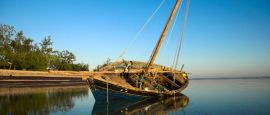Mozambique History, Language and Culture
History of Mozambique
Bantu tribes moved into an area, part of which is now Mozambique, from central and western Africa during the third century. The 11th-century Shona Empire, the main ethnic group in modern Zimbabwe, covered part of Mozambique and relations between the two peoples are still very close.
Mozambique attracted the attention of Arab and Indian traders in the 10th century. The first European expedition to Mozambique was led by the Portuguese explorer Vasco da Gama, who arrived in 1498. Thereafter, Portuguese influence gradually displaced the Arabs and Indians.
The Portuguese colonialists gradually moved inland, usurping the local rulers and taking over land and mineral resources. By the 18th century, they had developed Mozambique into a major centre for the slave trade, which continued to thrive for decades after its official banning in 1842.
Mozambique continued as a Portuguese colony until 1951 when it became an overseas province. The economy expanded rapidly during the 1950s and early 1960s, attracting thousands of Portuguese settlers to the country.
It was around this time that the first nationalist groups began to form. The main nationalist movement, FRELIMO, began a guerrilla war, which ended in 1974 following a military coup in Portugal. The new left-wing government in Lisbon had no wish to maintain an empire and independence negotiations began immediately. Mozambique became independent in 1975, and FRELIMO took power in a one-party state.
Then a 16-year-long civil war ensued. The National Resistance Movement (RENAMO), set up by the white-run Rhodesian government and then backed by apartheid South Africa and the US, fought a guerrilla war against FRELIMO from 1976 until the a ceasefire was brokered in 1992.
Elections were held in 1994 and won by FRELIMO. The new government was confronted with hundreds of thousands of refugees, as well as large numbers of demobilised soldiers from both sides, massive social and economic dislocation, and the destruction of virtually all health and education services.
Despite some setbacks, the Chissano government made steady progress in tackling these problems during the late 1990s, and in 1999 FRELIMO prevailed once again with Armando Guebuza becoming president. In the 2015 election, he was succeeded by Filipe Nyusi, also from FRELIMO.
Did you know?
• Apparently the name of the country arose from Musa al Big the name of an Arab who was living on Ilha de Mozabique when the Portuguese arrived.
• Over 22 years, more than 170,000 landmines were cleared from Mozambique. In some places specially trained rats were used to locate the mines. The country was declared free of the deadly weapons in 2015.
• Mozambique is home to five of the seven endangered species of sea turtles.




 You know where
You know where